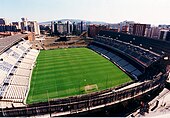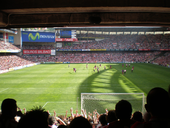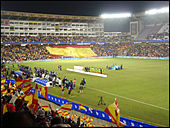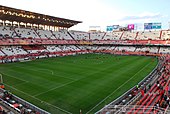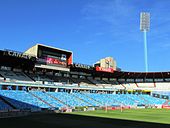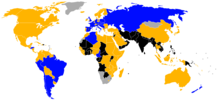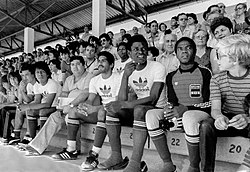Soccer World Cup 1982
The 1982 FIFA World Cup in Spain was the twelfth edition of the men's soccer world championship organized by FIFA. It was held in Spain from June 13 to July 11, 1982.
The championship had for the first time the participation of 24 national teams, through an expansion of the continental quotas in the qualifying phase. To accommodate them, changes were made to the competition system: there was a format with two leagues and a final phase that would only be used in this edition. The organizing committee enabled a total of 17 stadiums in 14 venues, including the Camp Nou for the inauguration and the Santiago Bernabéu for the grand final. The 1982 World Cup was the first to have representatives from all continents.
The Italian team became world champions for the third time, after defeating West Germany 3:1 in the final. from the second phase and took the title without having conceded a single defeat. The most outstanding of the tournament was Paolo Rossi, winner of the Golden Boot for top scorer and the Golden Ball for best player. On the other hand, the Italian captain Dino Zoff became the oldest footballer to lift the title of champions, at the age of 40.
Among the moments of this edition, the match between Italy and Brazil (3:2) held at the Sarriá stadium continues to be remembered as one of the best ever played in the history of the World Cup. Other notable events were the semifinal between France and Federal Germany, the first resolved in a penalty shootout; the attractive game played by the Brazilian team led by Telê Santana, led by Zico, Falcão and Sócrates; the irruption of the brother of the Emir of Kuwait in the middle of a game; the 10:1 win by Hungary against El Salvador, and the result agreed between Germany and Austria that qualified both for the second round, for which FIFA had to introduce unified schedules on the last day of the group stage.
As far as Spain is concerned, the 1982 World Cup was the first major event organized in the country after the restoration of democracy. The country's main stadiums were remodeled, money was invested in updating the transport network, and the accumulated experience would be used to obtain the concession of future events such as the 1992 Olympic Games. However, the national team did not meet expectations and fell in the second round with just one victory. The Naranjito mascot became the symbol of the tournament.
Choice of host country
The choice of venue for the 1974, 1978 and 1982 Soccer World Cups was resolved at the FIFA congress on October 6, 1964 in Tokyo, and was ratified two years later at the following congress in London. In accordance with the continental rotation criteria of the time, taking into account that Mexico would host the 1970 edition, European countries could apply only for the 1974 and 1982 tournaments.
Spain had tried to host the World Cup on two occasions: in the inaugural edition of 1930, where FIFA members opted for Uruguay, and in the 1966 edition, in which they ended up withdrawing before the vote. The original plan of the Spanish Football Federation (FEF) was to present candidacies in both 1974 and 1982, valuing the large number of stadiums, the sporting successes at the club level, and the support among various delegations. However, the favorite to host the 1974 World Cup was West Germany, so both countries agreed to support each other and thus prevent other candidates from running in an open election.
Organization
The tournament was held from June 13 to July 11, 1982, a few weeks after the main European soccer leagues ended, and near the beginning of summer in Spain.
The preparations for the World Championship coincided with the Spanish transition to democracy and were highly influenced by it. to contact the aspiring venues. In September 1978, the Government of Spain approved a royal decree to establish the Royal Organizing Committee of the World-82 (RCOM) in which the FEF, the Spanish Olympic Committee (COE) and the Culture Ministry. The presidency of the RCOM was entrusted to Raimundo Saporta, former vice president of Real Madrid, and within it also included the president of the IOC, Juan Antonio Samaranch, and the president of the FEF, Pablo Porta. FIFA supervised the preparations throughout through its own commissions. The most important tasks of the RCOM were the search for financing, the renovation of infrastructures and guaranteeing security.
For the international signal of the matches, Radiotelevisión Española (RTVE) renewed all its equipment and built the “Torrespaña” communications tower in Madrid.
Months before the inauguration, setbacks occurred that threatened the celebrations. On a political level, the most noteworthy was the failed coup d'état in 1981. On an organizational level, Saporta had to withdraw temporarily from RCOM due to illness, only to return a few weeks later, and there were problems with the travel agency Mundiespaña, set up for fan travel and ticket sales. It is considered that Spain took advantage of the celebration of the 82 World Cup to gain experience and apply for other major international events, including the 1992 Olympic Games.
According to FIFA data, the World Cup reported a gross profit of 60 million dollars —between ticket sales, television rights and publications— and expenses of more than 26 million dollars.
Locations
The 1982 World Cup is, to date, the most stadiums used in a single country: a total of 17 venues in 14 cities. The cities of Madrid, Barcelona and Seville would host two stadiums each, with the Camp Nou being chosen for the inauguration and the Santiago Bernabéu for the final. The rest of those chosen were, in alphabetical order: Alicante, Bilbao, Elche, Gijón, La Coruña, Malaga, Oviedo, Valencia, Valladolid, Vigo and Zaragoza.
To apply, it was necessary for the municipalities to present their candidacy to the Organizing Committee, have a team in the First Division or, otherwise, exceed 200,000 inhabitants. The final choice was made based on logistical criteria; Palma de Mallorca and Las Palmas de Gran Canaria, both shortlisted, were left out due to their status as island cities. San Sebastián could not attend either due to a lack of consensus on a possible stadium in Zubieta. Other rejected candidacies were those of Santander, Burgos, Cádiz and Granada.
Many of the stadiums used already existed before the venue was chosen, and in many cases they had undergone extensive remodeling. The only one built expressly for the tournament was the José Zorrilla Stadium in Valladolid, inaugurated in February 1982. Among the most important works are the partial remodeling of the Santiago Bernabéu, to which a roof was installed, and the expansion of the Camp Nou to make it the largest football stadium in Europe: 120,000 seats.
The unique format of this World Cup led to the number of venues being much higher than usual; each group was assigned a restricted geographical area, which allowed saving on travel. In the first phase, priority was given to the smaller and closest venues —for example, Group 1 took place entirely in Galicia—, while the second phase was divided between Barcelona (groups A and C) and Madrid (groups B and D). The two semifinals were played at the Camp Nou and at the Ramón Sánchez-Pizjuán, the match for third place was at the Rico Pérez Stadium, and the final at the Bernabéu. For weather reasons, the matches held in Seville, Malaga, Alicante and Elche could only be played after 9:00 p.m.
List of referees
A total of 41 referees participated during the 1982 World Cup.
Competition format
The competition format of Spain 1982 consisted of three stages and was only used in that edition. In a first round, the 24 teams were divided by draw into six groups of four participants. Within each group they would face each other once, by the system of all against all, with two points for victory, one for a tie and none for defeat. The ranking order is determined under the following criteria:
- The largest number of points obtained, taking into account all parties in the group
- The biggest difference in goals, taking into account all the parties in the group
- The largest number of goals in favor scored, taking into account all the parties in the group
The first two of each group qualified for the second round, with four blocks of three participants and under the same system. In this case, the winner of the first match rested on the following day, while the loser faced the third rival who had just rested. The order of classification depended on the following criteria:
- The largest number of points obtained, taking into account all parties in the group
- The biggest difference in goals, taking into account all the parties in the group
- The largest number of goals in favor scored, taking into account all the parties in the group
- Previous ranking in the first round
- Pure Drawing (as a last resort)
Only the group champions went to a direct elimination, with semifinals and a final, from which the winning country would emerge.
At that time there was no unified schedule for the last day of the group stage, so the teams could know the result of their direct rivals. The absence of this norm led to an agreed result in the match between West Germany and Austria in the first round, according to their interests for the classification. From Mexico 1986, FIFA stipulated that the last day of each group should be held simultaneously on same day and time.
Participating teams
The 1982 World Cup was the first to feature teams from all five continents, although not all were guaranteed a place. FIFA decided to expand the event to 24 participants at the 1978 Congress at the request of the Asian and African committees, which had led to the election of João Havelange as FIFA president. Although the Spanish organizers were reluctant, they would end up accepting in exchange that the European quota would also be extended.
Spain (hosts) and Argentina (reigning champions) achieved direct qualification. The rest of the quotas were as follows:
- AFC and OFC: 2 quotas
- CAF: 2 cups
- Concacaf: 2 cups
- Conmebol: 3 cups
- UEFA: 13 quotas
The debuting teams were: Algeria, Cameroon, Honduras, Kuwait and New Zealand.
Ranked
The qualifying phase for the 1982 World Cup saw the participation of a record 109 teams, four more than in the previous edition.
On the European side, the biggest news was the elimination of the Netherlands. The 1974 and 1978 runners-up found themselves outclassed as they found themselves in the same group with Belgium and France, the final qualifiers. There were outstanding returns such as those of England, Yugoslavia and the Soviet Union, who had not reached a final phase since the 1970 edition. In the case of the English, they could not certify the pass until the last day with a victory by the minimum over Hungary.
Two places were reserved for Concacaf, resolved in the hexagonal “VIII Concacaf Nations Championship” in Tegucigalpa. The Honduran national team asserted its status as host and finished group leader, getting into its first World Cup, while the other place went to El Salvador. Therefore, Mexico, the traditional power of the area, would be left out, after having added three consecutive draws in the last days. As for South America, the qualifiers were Brazil, Chile and Peru.
The Asia and Oceania round was resolved in a four-team final group for two places. The Kuwait team, coached by Carlos Alberto Parreira, finished the six days as group leader. The other vacancy had to be resolved in a tie-breaker match between New Zealand and the People's Republic of China, where the Oceanics won the ticket by winning 2:1 in Singapore. Both Kuwaitis and New Zealanders would contest a World Cup for the first time.
Finally, the Africa qualifier was resolved in a pure direct elimination that produced two other rookies: Algeria and Cameroon.
| Classifications | |||||
|---|---|---|---|---|---|
| CAF | AFC and OFC | UEFA | Concacaf | Conmebol | |
Raffle
The draw for the World Cup was held on January 16, 1982 at the Palacio de Congresos in Madrid, chaired by Prince Felipe and under the leadership of Hermann Neuberger and Joseph Blatter, vice president and secretary general of FIFA respectively. FIFA members opted for six seeds, one per group: West Germany, Argentina, Brazil, Spain, England and Italy. The hosts held a draw in which the countries appeared on balls in the shape of a football, drawn National Lottery drums for children from the Colegio de San Ildefonso. However, the ceremony was delayed due to organizational errors and because some balls had broken with the rotation of the drums.
Development
First phase
The opening of the World Cup took place on June 13, 1982 at the Camp Nou (Barcelona). After an inaugural gala presided over by King Juan Carlos I, at 9:00 p.m. the Group 3 match between Argentina and Belgium began. Although the current champions were favourites, with the star Diego Armando Maradona as the biggest claim after his absence in Argentina 1978, they ended up being defeated 1: 0 with a goal from Erwin Vandenbergh.
Group 1
The first group included the presence of Italy, Poland, Peru and Cameroon, and it was played entirely in Vigo and La Coruña. At the end of the second day there had been four draws and only two goals, so all the Countries had options to qualify on the last date. The Polish team got rid of the Peruvians by a resounding 5: 1, thanks to a tactical change by Antoni Piechniczek at the restart. In the other game, Italy drew 1:1 with Cameroon and was able to qualify in second place due to having accumulated more goals in their favor (2) in the instance. However, Enzo Bearzot's team was highly questioned because it had not been capable of winning a single clash of the three that he had played.
Group 2
The cities of Gijón and Oviedo were the scene of a group in which Federal Germany, Austria, Chile and Algeria participated. At the end of the second day, Austria was the surprising group leader with two victories and Chile virtually eliminated. Although the Germans were expected to dominate the group, they fell on the first day against Rabah Madjer's Algeria (2:1). On the last day, the Fennecs beat la Roja 3:2, so that the German team only needed a victory by the minimum to qualify. The match between West Germany and Austria ended 1:0 and put both teams in the second round, first and second respectively, to the indignation of El Molinón because there was not a single shot on goal after Horst Hrubesch's goal. Since no rule prevented collusion, FIFA had to establish unified schedules in the decisive matches from Mexico 1986.
Group 3
After the opening game, the teams from Argentina, Belgium, Hungary and El Salvador played their matches in Alicante and Elche. The Belgian team finished the phase as group leader with two wins and a draw, thanks to a brilliant performance by Jean-Marie Pfaff: one goal against and three in favor. The albiceleste did not come down with their initial defeat: they won 4:1 against Hungary, with an outstanding performance by Maradona and Ardiles, and then they prevailed over El Salvador to consolidate second place. a resounding 10:1 over a very young Salvadoran team that included "Mágico" González. The striker László Kiss became the first player to score a World Cup hat-trick starting as a substitute.
Group 4
The teams from England, France, Czechoslovakia and Kuwait played for the pass in Bilbao and Valladolid. The English won all the group games thanks to the performances of Bryan Robson, including the duel against France 3:1 on the first day. The team led by Michel Platini did not give up and on the following date they made a clear 4:1 against Kuwait, in a duel marked by a surreal anecdote: the referee Miroslav Stupar annulled a legal French goal after the Kuwaiti sheikh Fahd Al-Ahmad went down to the pitch to demand it, something that would end up costing him his license of arbitration. With the English as leaders, second place was settled between the Gauls and the Czechoslovaks. The bleus took the lead thanks to Didier Six, and Antonín Panenka's equalizer from a penalty was not enough to prevent the French from qualifying.
Group 5
The fifth group, played in Valencia and Zaragoza, featured teams from Spain, Yugoslavia, Northern Ireland and Honduras. A good performance was expected from the hosts within a relatively comfortable box, but their trajectory would be erratic: a draw against Honduras (1:1). a brief victory against the Yugoslavs with goals from Juanito and Saura (2:1) and a surprising defeat against Northern Ireland (0:1), in the end group leader. The Spaniards were overwhelmed by pressure and made mistakes throughout the tournament, especially in that last clash. However, José Santamaría's team was able to sign second place thanks to the worst results of their rivals. Northern Ireland's Norman Whiteside surpassed Pelé's record for the most recent World Cup international young: 17 years and 41 days.
Group 6
The teams from Brazil, the Soviet Union, Scotland and New Zealand met in Seville and Malaga. Telê Santana's canarinha became the favorites to take the title thanks to a showy attacking game in which Zico, Sócrates, Falcão and Éder stood out: they had to come back against the Soviets in the last few minutes (2:1) and they dominated the rest of the commitments with solvency. Aleksandr Chivadze and Oleg Blojín's USSR would take second place thanks to goal difference and a draw against Graeme Souness's Scotland on the final day. The New Zealanders did not take a single point on their debut.
Second phase
The 12 qualifiers were divided into four groups of three participants, who would play in Barcelona (groups A and C) and Madrid (groups B and D) with pre-assigned stadiums.
In Group A, Poland and the Soviet Union took advantage of Jean-Marie Pfaff's disciplinary leave to beat Belgium in their matches: 3:0 in the case of the Poles —with a hat-trick by Zbigniew Boniek— and 1: 0 in the soviet. By having a lower goal difference, the USSR was only worth the victory. However, Konstantín Béskov's team could not do anything against the solid tactical rival, dominated by Smolarek and Lato. The final 0:0 put Poland in the semifinals.
Spain were drawn in Group B with West Germany and England, who had drawn 0-0 in the first game. Although the Germans were less manned than their rivals, they had no trouble beating the hosts 2:1, both goals from Littbarski and Fischer. England needed to win by more than two goals to continue in the fight, but it did not go beyond 0:0 against a Spanish team that only played honor.
Group C was made up of three world champions: Italy, Brazil and Argentina. The Italians arrived with low expectations for their performance in the first round, but they beat the albiceleste (2:1) with the goalscoring success of Marco Tardelli and the defensive intensity of Claudio Gentile, who made a tough mark on Maradona without seeing a single card. In the next game, Brazil won the Argentines 3: 1. With the pass to the semifinals at stake, the Brazil-Italy match on July 5, 1982 is still remembered as the best of this World Cup. Striker Paolo Rossi, who had just completed a two-year ban, reappeared when His team needed him the most with a hat trick that made the goals from Sócrates and Falcão useless. Italy beat the canarinha by 3:2 and thus certified their classification.
Finally, France had no trouble leading Group D with two wins over Austria and Northern Ireland. In the first game, and before Platini was out, the French resolved 1:0 thanks to a direct free-kick from Bernard Genghini. The Northern Irish draw against the Austrians (2:2) gave them hope for a surprise, but in the last game they were no match for the French team: they won 4:1 with a brace from Giresse and Rocheteau.
Semifinals and third place
The two semifinals were played on July 8, 1982. In the afternoon the first between Italy and Poland took place at the Camp Nou, with a 2:0 victory for the transalpines thanks to goals from Rossi. The Poles They missed their striker Boniek, who was out due to card accumulation, and ended up running into the defensive wall of Scirea and Cabrini. At its conclusion, Sevilla's Sánchez-Pizjuán hosted the other semifinal between Federal Germany and France, marked by the high temperatures in Seville, by a frenetic pace and by Schumacher's attack on Battiston when going out towards a divided ball. With 1: 1 into regulation time, the French scored twice but Rummenigge and Fischer equalized (3:3) to force a penalty shootout. Despite the fact that Uli Stielike missed his chance, Schumacher became the architect of the Teutonic pass to the final after stopping the shots of Six and Bossis.
In the match for third and fourth place, held on July 10 at the Rico Pérez in Alicante, Poland defeated France 3:2. In this way, he would repeat the best position in his history that he had already achieved in the 1974 World Cup.
Ending
The World Cup final between Italy and West Germany took place in Madrid on July 11, 1982 at 8:00 p.m. (UTC+2), before more than 90,000 spectators who filled the Santiago Bernabéu Stadium. Both teams were on an upward trajectory and had exceeded initial forecasts, if the poor results achieved during the first phase are taken into account. However, the Italians were slightly favorites because they arrived in better physical shape than their rival, and they also had majority support among the local public. There were no significant casualties: the top German scorer Karl-Heinz Rummenigge was doubtful due to the flu but was finally able to play. Brazilian Arnaldo Cézar Coelho was trusted to lead the match.
The Italian coach Enzo Bearzot opted for a system of five defenders that included Claudio Gentile to the detriment of Antognoni, and whose objective was to make an exhausted opponent uncomfortable through a slow pace of play. The Germans tried to surprise in the first minutes, and even saw how the rival exhausted a change after Graziani's injury. However, Giuseppe Bergomi commanded the Azzurra defense to close any space for them. From that moment, Italy took control and could even have taken the lead after 25 minutes, when the referee awarded a penalty in favor of Italy for a foul by Briegel on Conti. His teammate Cabrini sent the shot down the baseline, so both arrived goalless at halftime.
In the second part, Italian dominance became more and more evident. The 1:0 came in minute 57 through a rehearsed play: Tardelli quickly took a free kick to surprise the German defense, Gentile put a cross into the area and Rossi did not miss the opportunity to finish off with a header, scoring the sixth goal of his personal account. With the score against, the Germans brought in one more striker and advanced lines, which left space for the transalpine attack to set up counterattacks. Marco Tardelli made it 2:0 with a powerful shot from the crescent, and Altobelli made it 3:0 after a pass from Conti. The euphoria of the public was reflected in the reaction of the president of Italy, Sandro Pertini, who effusively celebrated his country's goals from the authorities' box. Although Paul Breitner scored the final 3:1 seven minutes from time, against Germany He no longer had the strength to react. Italy was proclaimed the winner of the third Soccer World Cup in its history.
Results
First phase
Group 1
| Selection | Pts. | PJ | PG | PE | P | GF | GC | Dif. |
|---|---|---|---|---|---|---|---|---|
| POL | 4 | 3 | 1 | 2 | 0 | 5 | 1 | 4 |
| ITA | 3 | 3 | 0 | 3 | 0 | 2 | 2 | 0 |
| CMR | 3 | 3 | 0 | 3 | 0 | 1 | 1 | 0 |
| PER | 2 | 3 | 0 | 2 | 1 | 2 | 6 | -4 |
| 14 June 1982, 17:15 | Italy | 0:0 | Balaid Stadium, Vigo | |||
| Report | Assistance: 33.040 spectators Arbitrator: Michel Vautrot (France) | |||||
| 15 June 1982, 17:15 | Peru | 0:0 | Riazor Stadium, The Coruña | |||
| Report | Assistance: 11,000 spectators Arbitrator: Franz Wöhrer (Austria) | |||||
| 18 June 1982, 17:15 | Italy | 1:1 (1:0) | Balaid Stadium, Vigo | |||
| Conti | Report | Díaz | Assistance: 25,000 spectators Arbitrator: Walter Eschweiler (Federal Germany) | |||
| 19 June 1982, 19:15 | Poland | 0:0 | Riazor Stadium, The Coruña | |||
| Report | Assistance: 19,000 spectators Arbitrator: Alexis Ponnet (Belgium) | |||||
Group 2
| Selection | Pts. | PJ | PG | PE | P | GF | GC | Dif. |
|---|---|---|---|---|---|---|---|---|
| FRG | 4 | 3 | 2 | 0 | 1 | 6 | 3 | 3 |
| AUT | 4 | 3 | 2 | 0 | 1 | 3 | 1 | 2 |
| ALG | 4 | 3 | 2 | 0 | 1 | 5 | 5 | 0 |
| CHI | 0 | 3 | 0 | 0 | 3 | 3 | 8 | -5 |
| 17 June 1982, 17:15 | Chile | 0:1 (0:1) | Stadium Carlos Tartiere, Oviedo | |||
| Report | Schachner | Assistance: 22,500 spectators Arbitrator: Juan Daniel Cardellino (Uruguay) | ||||
| 20 June 1982, 17:15 | Federal | 4:1 (1:0) | Stadium El Molinón, Gijón | |||
| Rummenigge Reinders | Report | Moscoso | Assistance: 42,000 spectators Arbitrator: Bruno Galler (Switzerland) | |||
| 21 June 1982, 17:15 | Algeria | 0:2 (0:0) | Stadium Carlos Tartiere, Oviedo | |||
| Report | Schachner Krankl | Assistance: 22,000 spectators Arbitrator: Tony Boskovic (Australia) | ||||
Group 3
| Selection | Pts. | PJ | PG | PE | P | GF | GC | Dif. |
|---|---|---|---|---|---|---|---|---|
| Belgium | 5 | 3 | 2 | 1 | 0 | 3 | 1 | 2 |
| Argentina | 4 | 3 | 2 | 0 | 1 | 6 | 2 | 4 |
| Hungary | 3 | 3 | 1 | 1 | 1 | 12 | 6 | 6 |
| El Salvador | 0 | 3 | 0 | 0 | 3 | 1 | 13 | -12 |
| 13 June 1982, 20:00 | Argentina | 0:1 (0:0) | Belgium | Camp Nou Stadium, Barcelona | ||
| Report | Vandenbergh | Assistance: 95,000 spectators Arbitrator: Vojtech Christov (Checoslovaquia) | ||||
| 19 June 1982, 21:00 | Belgium | 1:0 (1:0) | New Stadium, Elche | |||
| Coeck | Report | Assistance: 15,000 spectators Arbitrator: Malcolm Moffat (North Ireland) | ||||
| 23 June 1982, 21:00 | Argentina | 2:0 (1:0) | El Salvador | Estadio José Rico Pérez, Alicante | ||
| Passella Bertoni | Report | Attendance: 32,500 spectators Arbitrator: Luis Barrancos (Bolivia) | ||||
Group 4
| Selection | Pts. | PJ | PG | PE | P | GF | GC | Dif. |
|---|---|---|---|---|---|---|---|---|
| England | 6 | 3 | 3 | 0 | 0 | 6 | 1 | 5 |
| France | 3 | 3 | 1 | 1 | 1 | 6 | 5 | 1 |
| Czechoslovakia | 2 | 3 | 0 | 2 | 1 | 2 | 4 | -2 |
| Kuwait | 1 | 3 | 0 | 1 | 2 | 2 | 6 | -4 |
| 16 June 1982, 17:15 | England | 3:1 (1:1) | San Mamés, Bilbao | |||
| Robson Mariner | Report | Soler | Assistance: 44,172 spectators Arbitrator: António Garrido (Portugal) | |||
| 17 June 1982, 17:45 | Czechoslovakia | 1:1 (1:0) | Jose Zorrilla Stadium, Valladolid | |||
| Panenka | Report | Al-Dakheel | Assistance: 25,000 spectators Arbitrator: Benjamin Dwomoh (Ghana) | |||
| 20 June 1982, 17:15 | England | 2:0 (0:0) | San Mamés, Bilbao | |||
| Francis Barmos | Report | Assistance: 41,123 spectators Arbitrator: Charles Corver (Netherlands) | ||||
| 24 June 1982, 17:15 | France | 1:1 (0:0) | Jose Zorrilla Stadium, Valladolid | |||
| Six | Report | Panenka | Assistance: 28,000 spectators Arbitrator: Paolo Casarin (Italy) | |||
| 25 June 1982, 17:15 | England | 1:0 (1:0) | San Mamés, Bilbao | |||
| Francis | Report | Assistance: 39,700 spectators Arbitrator: Gilberto Aristizábal (Colombia) | ||||
Group 5
| Selection | Pts. | PJ | PG | PE | P | GF | GC | Dif. |
|---|---|---|---|---|---|---|---|---|
| NIR | 4 | 3 | 1 | 2 | 0 | 2 | 1 | 1 |
| ESP | 3 | 3 | 1 | 1 | 1 | 3 | 3 | 0 |
| YUG | 3 | 3 | 1 | 1 | 1 | 2 | 2 | 0 |
| HON | 2 | 3 | 0 | 2 | 1 | 2 | 3 | -1 |
| 16 June 1982, 21:00 | SpainSpain | 1:1 (0:1) | Honduras | Stadium Luis Casanova, Valencia | ||
| López Ufarte | Report | Zelaya | Assistance: 49.562 spectators Arbitrator: Arturo Ithurralde (Argentina) | |||
| 17 June 1982, 21:00 | Yugoslavia | 0:0 | Stadium La Romareda, Zaragoza | |||
| Report | Assistance: 25,000 spectators Arbitrator: Erik Fredriksson (Sweden) | |||||
| 20 June 1982, 21:00 | Spain | 2:1 (1:1) | Stadium Luis Casanova, Valencia | |||
| Juanito Saura | Report | Gudelj | Assistance: 48,000 spectators Arbitrator: Henning Lund Sørensen (Denmark) | |||
| 24 June 1982, 21:00 | HondurasHonduras | 0:1 (0:0) | Yugoslavia | Stadium La Romareda, Zaragoza | ||
| Report | Petrović | Assistance: 25,000 spectators Arbitrator: Gastón Castro (Chile) | ||||
| 25 June 1982, 21:00 | Spain | 0:1 (0:0) | Stadium Luis Casanova, Valencia | |||
| Armstrong | Report | Assistance: 49.562 spectators Arbitrator: Héctor Ortiz (Paraguay) | ||||
Group 6
| Selection | Pts. | PJ | PG | PE | P | GF | GC | Dif. |
|---|---|---|---|---|---|---|---|---|
| Brazil | 6 | 3 | 3 | 0 | 0 | 10 | 2 | 8 |
| Soviet Union | 3 | 3 | 1 | 1 | 1 | 6 | 4 | 2 |
| Scotland | 3 | 3 | 1 | 1 | 1 | 8 | 8 | 0 |
| New Zealand | 0 | 3 | 0 | 0 | 3 | 2 | 12 | -10 |
| 19 June 1982, 21:00 | Soviet Union | 3:0 (1:0) | La Rosaleda Stadium, Malaga | |||
| Gavrilov Blokhin Baltacha | Report | Assistance: 19,000 spectators Arbitrator: Yusef Mohammed El Ghoul (Libya) | ||||
Second phase
Group A
| Selection | Pts. | PJ | PG | PE | P | GF | GC | Dif. |
|---|---|---|---|---|---|---|---|---|
| Poland | 3 | 2 | 1 | 1 | 0 | 3 | 0 | 3 |
| Soviet Union | 3 | 2 | 1 | 1 | 0 | 1 | 0 | 1 |
| Belgium | 0 | 2 | 0 | 0 | 2 | 0 | 4 | -4 |
| 28 June 1982, 21:00 | Poland | 3:0 (2:0) | Camp Nou Stadium, Barcelona | |||
| Boniek | Report | Assistance: 65,000 spectators Arbitrator: Luis Paulino Siles (Costa Rica) | ||||
| 1 July 1982, 21:00 | Belgium | 0:1 (0:0) | Camp Nou Stadium, Barcelona | |||
| Report | Oganesian | Assistance: 45,000 spectators Arbitrator: Michel Vautrot (France) | ||||
| 4 July 1982, 21:00 | Poland | 0:0 | Camp Nou Stadium, Barcelona | |||
| Report | Assistance: 65,000 spectators Arbitrator: Robert Valentine (Scotland) | |||||
Group B
| Selection | Pts. | PJ | PG | PE | P | GF | GC | Dif. |
|---|---|---|---|---|---|---|---|---|
| 3 | 2 | 1 | 1 | 0 | 2 | 1 | 1 | |
| 2 | 2 | 0 | 2 | 0 | 0 | 0 | 0 | |
| 1 | 2 | 0 | 1 | 1 | 1 | 2 | -1 |
| 29 June 1982, 21:00 | Federal | 0:0 | Stage Santiago Bernabéu, Madrid | |||
| Report | Attendance: 75,000 spectators Arbitrator: Arnaldo Coelho (Brazil) | |||||
| 2 July 1982, 21:00 | Federal | 2:1 (0:0) | Stage Santiago Bernabéu, Madrid | |||
| Littbarski Fischer | Report | Zamora | Attendance: 9,089 spectators Arbitrator: Paolo Casarin (Italy) | |||
| 5 July 1982, 21:00 | Spain | 0:0 | Stage Santiago Bernabéu, Madrid | |||
| Report | Attendance: 75,000 spectators Arbitrator: Alexis Ponnet (Belgium) | |||||
Group C
| Selection | Pts. | PJ | PG | PE | P | GF | GC | Dif. |
|---|---|---|---|---|---|---|---|---|
| Italy | 4 | 2 | 2 | 0 | 0 | 5 | 3 | 2 |
| Brazil | 2 | 2 | 1 | 0 | 1 | 5 | 4 | 1 |
| Argentina | 0 | 2 | 0 | 0 | 2 | 2 | 5 | -3 |
| 29 June 1982, 17:15 | Italy | 2:1 (0:0) | Sarriá Stadium, Barcelona | |||
| Tardelli Cabrini | Report | Passarella | Assistance: 43,000 spectators Arbitrator: Nicolae Rainea (Romania) | |||
| 2 July 1982, 17:15 | Argentina | 1:3 (0:1) | Sarriá Stadium, Barcelona | |||
| Díaz | Report | Zico Serginho Junior | Assistance: 44,000 viewers Arbitrator: Mario Rubio Vázquez (Mexico) | |||
| 5 July 1982, 17:15 | Italy | 3:2 (2:1) | Sarriá Stadium, Barcelona | |||
| Rossi | Report | Socrates Falcão | Assistance: 44,000 viewers Arbitrator: Abraham Klein (Israel) | |||
Group D
| Selection | Pts. | PJ | PG | PE | P | GF | GC | Dif. |
|---|---|---|---|---|---|---|---|---|
| France | 4 | 2 | 2 | 0 | 0 | 5 | 1 | 4 |
| Austria | 1 | 2 | 0 | 1 | 1 | 2 | 3 | -1 |
| Northern Ireland | 1 | 2 | 0 | 1 | 1 | 3 | 6 | -3 |
| 28 June 1982, 17:15 | Austria | 0:1 (0:1) | Vicente Calderón Stadium, Madrid | |||
| Report | Genghini | Assistance: 37,000 spectators Arbitrator: Karoly Palotai (Hungary) | ||||
Final Phase
| Semifinals | Final | |||||
| 8 July − Barcelona | ||||||
| POL | 0 | |||||
| 11 July - Madrid | ||||||
| ITA | 2 | |||||
| ITA | 3 | |||||
| 8 July − Seville | ||||||
| FRG | 1 | |||||
| FRG | 3 (5) | |||||
| FRA | 3 (4) | |||||
| Party for third place | ||||||
| 10 July − Alicante | ||||||
| POL | 3 | |||||
| FRA | 2 | |||||
Semi-finals
| 8 July 1982, 17:15 | Poland | 0:2 (0:1) | Camp Nou, Barcelona | |||
| Report | Rossi | Assistance: 50,000 spectators Arbitrator: Juan Daniel Cardellino (Uruguay) | ||||
Third place
Ending
| Champion Italy 3.♪ title |
Statistics
Acknowledgments
Golden Boot
For the first time in the history of the World Cup, FIFA would award the Golden Boot in recognition of the competition's top scorer. In total, 146 goals were scored (2.81 per game).
Ballon d'Or
The Ballon d'Or honors the best player of each World Cup. FIFA drew up a list of the 10 most outstanding footballers, later voted on by representatives of the accredited press.
Fair Play Award
It is awarded to the team that had the fewest bookings and played in the elimination phase, as long as it has passed to the second phase.
| Country |
|---|
| Brazil |
All-Star Team
| Porteros | Defenders | Midfielders | Delanteros |
|---|---|---|---|
Symbols
Ball
The German brand Adidas was the official supplier of the World Cup ball since 1970. On this occasion the "Adidas Tango" model released in Argentina in 1978 was repeated: the ball was made up of twenty panels that created the optical impression of twelve identical circles. However, this time leather was combined with polyurethane to make it waterproof.
Corporate image
The official logo of Spain 1982 consisted of a soccer ball whose wake recalls the Spanish flag. It was designed by Luis Díaz Ricote.
One of the most noteworthy aspects of this World Cup was the ordering of 15 artistic posters by the Organizing Committee: one for the main event and 14 for each of the venues. The commemorative poster for the World Cup, entitled La Fiesta, is the work of Joan Miró and represents a footballer through the characteristic surrealist prism of the Catalan painter. Its official presentation took place in December 1980.
The rest of the 14 posters were carried out by prestigious Spanish and foreign artists: Pierre Alechinsky (Alicante), Antoni Tàpies (Barcelona), Eduardo Chillida (Bilbao), Jiri Kolar (Elche), Gérard Titus-Carmel (Gijón), Erró (La Coruña), Eduardo Arroyo (Madrid), Roland Topor (Málaga), Pol Bury (Oviedo), Antonio Saura (Seville), Valerio Adami (Valencia), Vladimir Veličković (Valladolid), Jacques Monory (Vigo) and Jean -Michel Folon (Zaragoza).
Official Song
The 1982 Spanish national anthem was El Mundial, a pasodoble performed by Plácido Domingo with lyrics by Alfredo Garrido.
Pet
The official mascot of the 1982 World Cup was "Naranjito", created by the Sevillian publicists María Dolores Salto and José María Martín Pacheco. It was an anthropomorphic orange dressed in the colors of the Spanish team and with a ball football under his arm, and his choice responds to a distancing from the stereotypes commonly associated with Spain; instead, the creatives opted for a fruit characteristic of Valencia. On the other hand, FIFA had Sport Billy as a fair play mascot.
In 1979 the RFEF organized a contest open to Spanish advertising agencies, in which an expert jury would make the final decision. The creators of Naranjito took a million pesetas as a reward, but in return the Federation kept the image rights of the character, later resold to the British company West Nally for a total of 1400 million of pesetas. The finalists were "Brindis", a bullfighter-boy designed by the publicist Enrique Gabernet, and "Toribalón", a bull with the body of a balloon created by the poster artist Pedro María Laperal.
Naranjito was officially presented on May 29, 1979. At the time of the announcement, the mascot was the subject of numerous criticisms: from sectors of society who wanted a more traditional symbol of Spanish culture, to others who lamented the naive and kitsch appearance. However, its popularity grew as the event approached, until it appeared in any marketing product of the time. He would come to have his own animated series, the Spanish-Japanese co-production Fútbol en acción , broadcast by Televisión Española between 1981 and 1982.
Today, Naranjito is considered one of the symbols of the 1980s in Spanish popular culture.
Contenido relacionado
Paris-Tours
Yoshinkan
Moriteru Ueshiba




